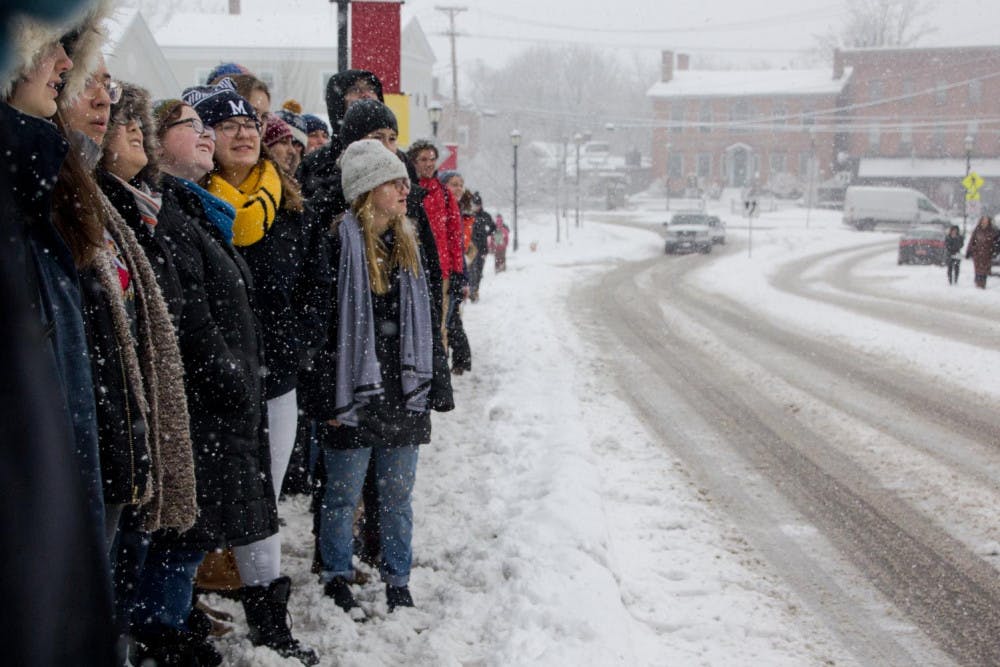MONTPELIER — On Feb. 14, Nikolas Cruz opened fire on students at Douglas High School in Parkland, Florida with an AR-15 assault rifle, killing 17 students and wounding 17 more. This act of what Florida governor Rick Scott termed “pure evil” has sparked become a watershed moment, national action for gun control.
On Mar. 14, a month after the massacre, thousands of high school students across the country walked out of their classes to demand action on gun control from Congress. However, the walkout was not limited to high schoolers; many college students joined in support of gun control legislation, including many Middlebury College students and faculty.
Closer to home, a foiled school shooting attempt in Rutland, Vermont also brought gun control to the attention of the Vermont legislature. Just days after the Parkland shooting, Jack Sawyer, a former student of Fair Haven Union High School, plotted to commit a similar shooting there. It was only through a tip to the police from a friend that his intentions were discovered. Sawyer, 18, had purchased a 12 gauge shotgun and had written of his willingness to follow through on the plot in a diary he titled “Journal of an Active Shooter.”
This foiled plot, on top of the Parkland shooting, has brought a great deal of attention to the national conversation about gun control. On the VT Senate floor, Democratic Senator Phil Baruth recently noted that “mass shootings are a viral phenomenon, and Vermont has caught that virus, like every other state in the union.”
In the face of this phenomenon, Vermont’s state house has responded by taking action in the Senate. On Wednesday, Feb. 28, Vermont’s Senate unanimously passed a bill that would permit police to confiscate firearms from any individual whom a court deems an “extreme risk” to either themselves or others. Senate Judiciary chair Dick Sears sponsored the bill and conveyed the impact of recent shootings, telling Seven Days that “Fair Haven jolted us all.”
The widespread support of this bill is another indication of the impact these recent school shootings have had on Vermont; all seven Republican members of Vermont’s Senate voted for this bill. Republican Senator Randy Brock supported the bill along the lines that it was not gun control, but “lunatic-control.” Even Governor Phil Scott’s tone on gun control has been subject to change in the face of these events.

More than 100 Montpelier High School students walked out of the school Wednesday and rallied at the State House for safer schools and gun legislation.
The passage of this “Extreme Risk” bill in the Senate is intimately related to a similar bill passed by the VT House of Representatives a year ago, which would allow police to confiscate firearms from perpetrators of domestic abuse. Sears, who sponsored the “Extreme Risk” bill, was skeptical of the domestic violence bill because of its possible infringement upon due process. His recent bill, therefore, requires a court order before any confiscation can take place.
While the Senate has refused to act on the domestic violence bill since last year, the House added the “Extreme Risk” bill and language from the domestic violence bill to their own H. 675. Lawmakers must now decide on which language to accept or compromise.
While the “Extreme Risk” bill gained a great amount of traction in the Senate, other measures taken in response to the Parkland shooting and Fair Haven plot have not had such united support. On Mar. 1, the Senate narrowly approved an amendment to another bill (S. 55) to include language regarding universal background checks in purchasing firearms. Seven Days reported that the amendment would require the purchaser of a firearm to undergo a federal criminal background check.
This amendment faced some opposition, passing by a vote of 17 to 13. Republican Senator Joe Benning, an opponent of the bill, took the Senate floor to emphasize the ineffectiveness of background checks by reading off a list of school shootings committed by individuals who underwent such checks. Senator John Rodgers also opposed the bill on the grounds that the use of a background check would impose additional costs on those attempting to purchase a firearm.
The day after the Senate’s vote on the universal background check amendment, the Senate passed another measure to S. 55 to increase the age of purchasing guns from 16 to 21. Seven Days reported that the bill was championed by Senate President Tim Ashe with 15 cosponsors. Ashe addressed the Senate, saying that the bill was designed to prevent young people from doing harm to either themselves or others with such dangerous weapons.
This bill passed more comfortably by a vote of 21 to 9; however, it still faced some opposition from both Republicans and Democrats in the Senate. Senator Benning, who also opposed the amendment to include universal background checks in S. 55, dissented to this measure, likening it to his time protesting the Vietnam War. He recalled that the protests occurred because one could be drafted into the military at 18 but could not vote until 21. It would be similarly outrageous, he said, that one could be drafted into the military while not being able to purchase a firearm. Senator John Rodgers offered a similar critique, saying that by drafting individuals at 18, the government recognizes their maturity.
Gov. Scott has also changed his tone in response to recent events. Seven Days reported that Gov. Scott campaigned on an anti-gun control platform, but has now called for reform. At a press conference on Mar. 1, Gov. Scott said, “I think Vermonters are looking for us to do something.” Taking action, he said, “sends a message that we care, we can put politics aside and do what’s right.” Seven Days reported that Gov. Scott said he would probably support both universal background checks and raising the legal age to purchase firearms to 21.




